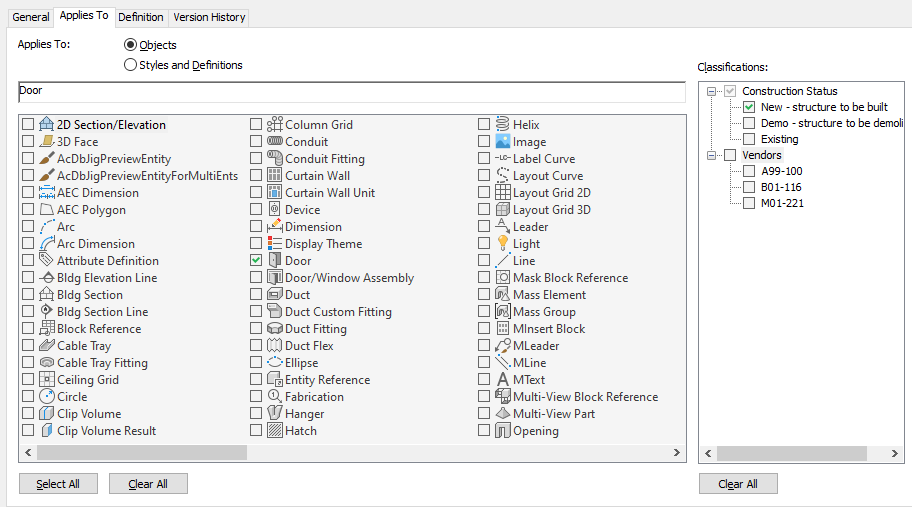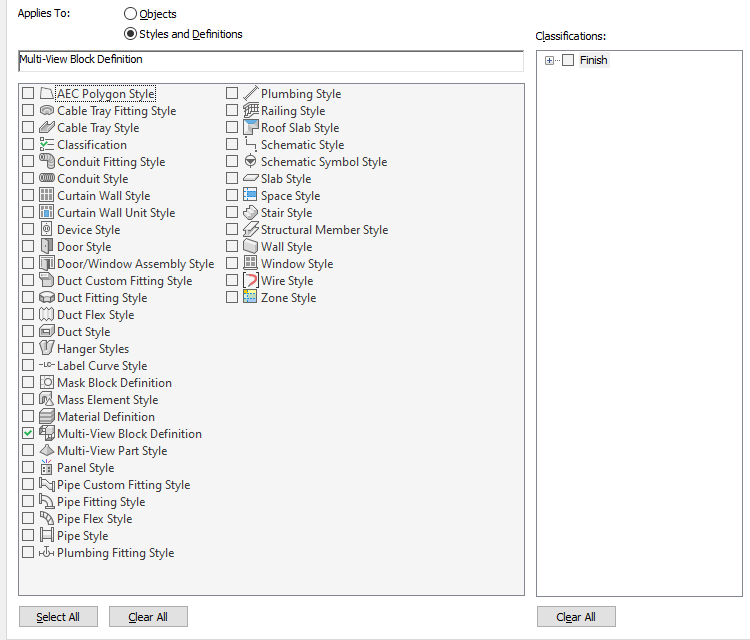The data reported in a schedule table is collected from property sets that you attach to the objects or object styles you are scheduling. The properties contained in a property set are determined by the property set definition, which also specifies the object type, style, and definition to which the property set can be applied.
- selections on the Applies To tab and names for property set definitions
- anything that affects the value of underlying data and names for property definitions
A property set definition is a group of related properties of the objects and object styles to be reported in the schedule. Once attached to an object or its style, a property set becomes the container for the property data associated with the object. Values for properties are obtained directly from the object or are entered manually for the object or the style.

A property set definition for a door object
Automatic and Manual Properties
Properties for AEC object types fall into two categories:
- Automatic properties are built into objects and styles when you create the object. Examples are width, length, height, and data retrieved from other sources, such as the project or the object’s material.
- Manual properties are those that you enter explicitly, such as fire rating, manufacturer, or finish.
Automatic properties are available to include in your property set definitions. You create and enter values for manual properties.
Applying Property Set Definitions to Objects and Styles
You can create a property set definition for either objects or styles and definitions (like multi-view block definitions). Manual properties that are likely to be different for each instance of an object belong in an object-based property set definition that is applied by object.

Property set definition that applies to door objects
Manual properties that will be the same for all instances of a style belong in a style-based property set definition that is applied to a style (such as a wall style) or a definition (such as a multi-view block definition).

Property set definition that applies to multi-view block definition
Automatic properties are dynamically retrieved from the object. Most automatic properties should be put in a style-based property set definition, even if values may vary for each instance of the object. For example, the properties “Door Width” and “Door Height” are extracted automatically from door objects. Placing these properties in a style-based property set definition provides a value for each door object of that style, and is more efficient than putting them in an object-based property set definition that you then attach to each door.
Fields in Property Set Data
You can enter AutoCAD fields in a manual property attached to an object or style. Fields enhance the documentation capabilities within a drawing file because the values they display update whenever the associated property changes. Fields can also be associated with hyperlinks. For example, if you insert a field pointing to a drawing using a hyperlink in a manual property, and create a schedule table that contains that property, you can jump from the table cell with the field property in it to the drawing to which it is linked.
Lists in Property Set Data
List items are created in a list definition and are attached to a manual property definition. With a predefined list of valid items, you can select an item from the list for a manual property either in the property set definition or on the Extended Data tab of the Properties palette. This reduces the redundancy of entering values that are commonly used.
Predefined Content for Schedules
There are predefined styles and properties for schedule table tools, schedule tag tools, and property set definitions provided with the software. The tools are located on the Scheduling tool palette in the Document tool palette set, and the property set definitions are in Style Manager under Documentation Objects.
You can also access default schedule table styles, schedule tags, and property set definitions in C:\ProgramData\Autodesk\ACA <version>\enu\Styles\<Imperial or Metric>\Schedule Tables.dwg. You can use any of this content to create additional schedules or as the basis for creating custom schedules, tags, and property set definitions.